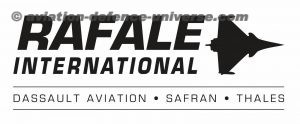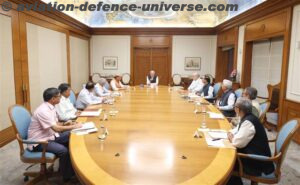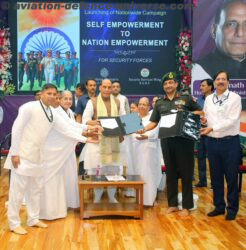
New Delhi. 14 December 2018. The Supreme Court stated that the issue of IOP is what has triggered this litigation. The offset contract is stated to have been governed by the Defence Offset Guidelines of DPP 2013. Two of the said contracts were signed with Dassault and M/s MBDA Missile Systems Limited on 23rd September, 2016, the same day on which the IGA was signed between the Government of India and the Government of France. These are the French industrial suppliers of the Aircraft package and Weapon Package respectively. There are stated to be no offset obligations in the first three years, but the offset obligations are to commence from October 2019 onwards.
“The complaint of the petitioners is that the offset guidelines contemplate that the vendor will disclose details about the Indian Offset partner however, in order to help the business group in India in question, an amendment was carried out in paragraph 8 of the Offset Guidelines that too with retrospective effect. By virtue of the said amendment it is contended that cloak of secrecy is cast about the Offset partner and the vendor is enabled to give the details at a much later point of time. It is contended, however, that other provisions of the Offset Guidelines remain unamended, and, therefore, Government cannot pretend ignorance about the Indian Offset partner as has been done in the affidavit filed. It is complained that favouring the Indian business group has resulted in offence being committed under the Prevention of Corruption Act.
As per clause 8 of DPP 2013, dealing with the processing of offset proposals, it has been stated in clause 8.2 that the TOEC will scrutinize the technical offset proposals (excluding proposals for Technology Acquisition by DRDO as per para 8.3) to ensure conformity with the offset guidelines. For this purpose, the vendor may be advised to undertake changes to bring his offset proposals in conformity with the offset guidelines. The TOEC will be expected to submit its report within 48 weeks of its constitution.”
It has been categorically stated that the vendor/OEM is yet to submit a formal proposal, in the prescribed manner, indicating the details of IOPs and products for offset discharge. A press release in the form of a ‘Clarification on Offset Policy’, posted on 22nd September, 2018 has also been placed before us. Inter alia, it states that the Government reiterates that it has no role to play in the selection of the IOP. As per the Defence Offset Guidelines, the OEM is free to select any Indian company as its IOP. A joint venture is stated to have come into being between Reliance Defence and Dassault in February 2017, which is stated to be a ‘purely commercial arrangement’ between the two private companies. As per the guidelines, the vendor is to provide details of the IOPs, either at the time of seeking offset credit or one year prior to discharge of offset obligation, which would be due from 2020 onwards. The OEM/vendor/TierI subvendor will be free to select the Indian offset partner for implementing the offset obligation provided the IOP has not been barred from doing business by the Ministry of Defence.”
Despite the aforesaid illustration, the petitioners kept on emphasising that the French Government has no say in the matter, as per media reports. It is also stated that there was no reason for Dassault to have engaged the services of Reliance Aerostructure Ltd., through a joint venture, when the company itself had come into being only on 24th April, 2015. The allegation, thus, is that the Indian Government gave a benefit to Reliance Aerostructure Ltd., by compelling Dassault to enter into a contract with them, and that too at the cost of the public enterprise, HAL.
It is no doubt true that the company, Reliance Aerostructure Ltd., has come into being in the recent past, but the press release suggests that there was possibly an arrangement between the parent Reliance company and Dassault starting from the year 2012. As to what transpired between the two corporates would be a matter best left to them, being matters of their commercial interests, as perceived by them. There has been a categorical denial, from every side, of the interview given by the former French President seeking to suggest that it is the
Indian Government which had given no option to the French Government in the matter. On the basis of materials available before us, this appears contrary to the clause in DPP 2013 dealing with IOPs which has been extracted above. Thus, the commercial arrangement, in our view, itself does not assign any role to the Indian Government, at this stage, with respect to the engagement of the IOP. Such matter is seemingly left to the commercial decision of Dassault. That is the reason why it has been stated that the role of the Indian Government would start only when the vendor/OEM submits a formal proposal, in the prescribed manner, indicating details of IOPs and products for offset discharge. As far as the role of HAL, insofar as the procurement of 36 aircrafts is concerned, there is no specific role envisaged. In fact, the suggestion of the Government seems to be that there were some contractual problems and Dassault was circumspect about HAL carrying out the contractual obligation, which is also stated to be responsible for the non conclusion of the earlier contract.
“Once again, it is neither appropriate nor within the experience of this Court to step into this arena of what is technically feasible or not. The point remains that DPP 2013 envisages that the vendor/OEM will choose its own IOPs. In this process, the role of the Government is not envisaged and, thus, mere press interviews or suggestions cannot form the basis for judicial review by this Court, especially when there is categorical denial of the statements made in the Press, by both the sides. We do not find any substantial material on record to show that this is a case of commercial favouritism to any party by the Indian Government, as the option to choose the IOP does not rest with the Indian Government,” concluded the apex court.






























































































































